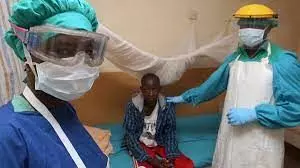Enhance hygiene to fight Lassa Fever, Meningitis outbreaks - NCDC

The Nigeria Centre for Disease Control and Prevention (NCDC) has urged the general public to enhance their personal and environmental hygiene.
Dr Jide Idris, Director General, NCDC said this in an interview with newsmen on Tuesday in Abuja.
Idris said that such a step was necessary as the risk of Cerebrospinal Meningitis (CSM) and Lassa fever outbreaks increased in the upcoming season.
.
Supreme News reports that Lassa fever is an acute viral hemorrhagic fever (VHF) caused by the Lassa virus.
Meningitis occurs when there is an acute inflammation of the covering of the brain and the spinal cord.
As of October 13, Nigeria recorded 8,569 suspected cases of Lassa Fever. 1,035 confirmed cases, and 174 deaths have been reported across 28 States and 129 Local Government Areas (LGAs).
On the other hand, in 2023/2024, Nigeria recorded 4,915 suspected meningitis and 380 confirmed cases with 361 deaths across 174 LGAs in 24 States including the Federal Capital Territory (FCT).
Idris said that the NCDC’s alert on Lassa fever and meningitis was essential to prevent avoidable loss of life, which impacted individuals, families, and the nation.
He said that the diseases were preventable with proactive measures in place.
To this end, he said that the NCDC had strengthened its prevention and mitigation strategies well ahead of the anticipated outbreak period.
The NCDC DG highlighted the necessity of early action, especially given the cases of both diseases already recorded this year.
According to him, the NCDC is committed to comprehensive efforts aimed at reducing the spread and impact of these infections across Nigeria.
On Lassa Fever, he said the Federal Government, through the Federal Ministry of Health and Social Welfare and NCDC, led efforts to prevent, detect, and respond to cases of Lassa fever across the country.
He said that the country had continued to see a steady increase in the number of states reporting Lassa fever cases due to improved surveillance, and better community awareness.
He said environmental degradation from climate change, and other harmful human activities were also responsible for the increase.
“In 2022, Nigeria reported 1,067 confirmed cases across 27 States and 112 Local Government Areas (LGAs).
“In 2023, 28 States and 114 LGAs reported confirmed cases, with 9,155 suspected cases, 1,270 confirmed cases, and 227 deaths.
“As of October 13, 8,569 suspected cases, 1,035 confirmed cases, and 174 deaths have been reported across 28 states and 129 LGAs.
“The disease is also associated with significant loss of livelihood in the communities it ravages,” he said.
Idris also described meningitis as an epidemic-prone disease with cases reported all year round in Nigeria.
He said that weather conditions like the dry season that comes with dust, winds, cold nights, and frequent upper respiratory tract infections increased the risk of infection, especially with crowding and poor ventilation.
“The highest burden of CSM in Nigeria occurs in the “Meningitis Belt”.
“This includes all 19 States in the Northern region, the Federal Capital Territory (FCT), and some southern States such as Bayelsa, Cross River, Delta, Ekiti, Ogun, Ondo, Osun.
“In 2023/2024, Nigeria recorded 4,915 suspected cases and 380 confirmed cases, with 361 deaths across 174 Local LGAs in 24 States including the FCT, ” he said.
He said that a total of 2.281 million doses of Men 5CV- ACWYX have been deployed to Bauchi, Gombe, Jigawa and Yobe covering 134 wards in the 13 LGAs.
“The campaign targeted individuals aged one to 29 years, comprising 70 per cent of the population.
“Despite significant progress in surveillance, diagnostic capacity, and vaccination over the last few years, CSM remains a priority disease and ever-present public health threat in Nigeria.
“It has annual outbreaks in high-burden states that present a challenge for people, health systems, economies, and communities,” Idris said.
He said that the NCDC was reinforcing its preparedness to manage potential Lassa fever and CSM outbreaks, with the One-Health approach taking centre stage.
Recognising the constraints at the state level, he said that the agency had focused on supporting states through regular engagements.
According to him, NCDC’s Sub-national Support Department is actively re-engaged to aid state-level preparedness and emergency response.
He said that the support included training state epidemiologists, Disease Surveillance Officers (DSOs), and laboratory personnel to understand local challenges and enhance response systems.
He said that data-driven modelling also played a role, with agencies like the Nigerian Meteorological Agency (NIMET) providing predictive data on environmental factors affecting disease spreads.
The DG also said that establishing essential infrastructure, adequate staffing, and standardised treatment protocols were essential to ensure rapid and effective response.
He said that the NCDC was collaborating with international bodies for technical support, and with agencies like the National Orientation Agency (NOA) for awareness campaigns.
This collaboration, according to him, extends to correctional facilities, where preventive advisories are particularly crucial given the high risk of disease spread in overcrowded conditions.
To prevent Lassa fever and meningitis, he advised the public to keep homes clean, block rodent entry points, safely store food, avoid bush burning, and maintain hygiene.
He urged people to seek early medical care for symptoms while healthcare workers should practice infection control and report suspected cases promptly for quick intervention.



